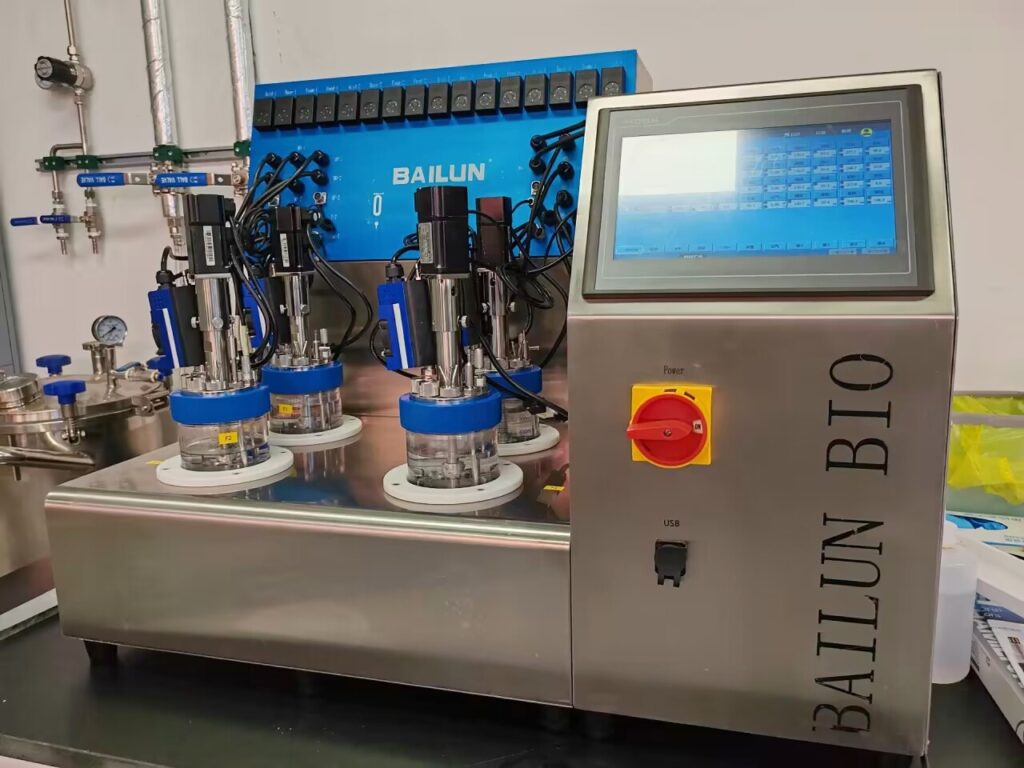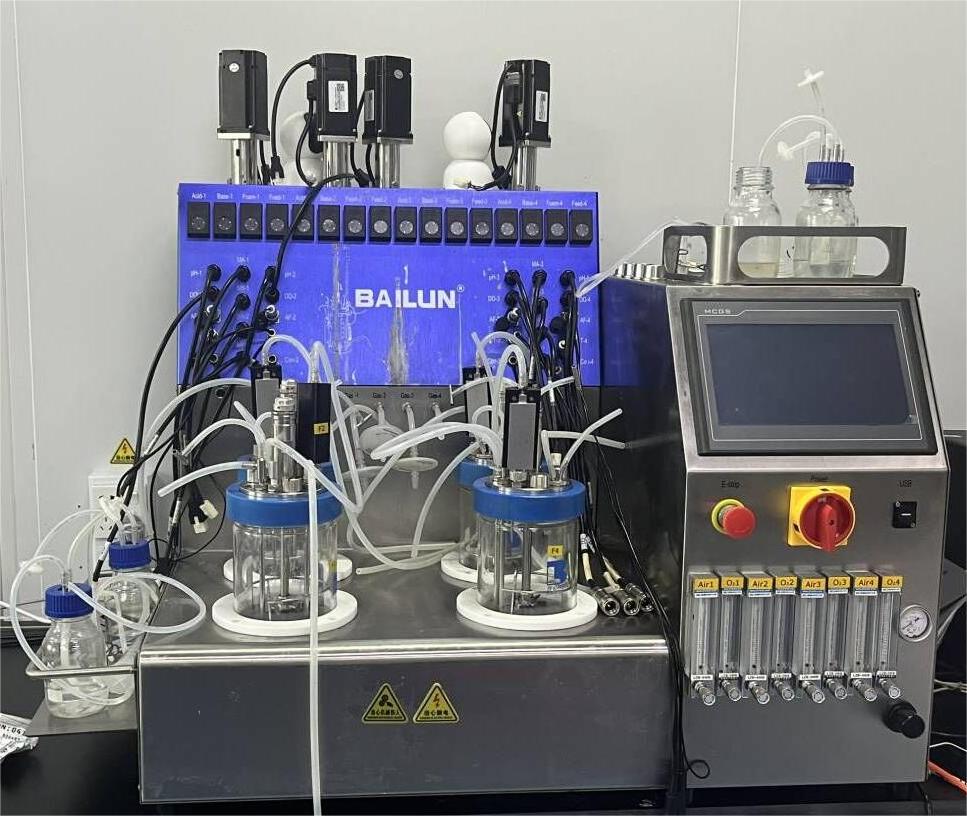Biotechnology and life sciences are one of the important driving forces of the new scientific and technological revolution in the 21st century. The new generation of industrial biotechnology with microbial fermentation technology as the core is playing an increasingly important role, and large-scale screening of high-yield strains has therefore been listed as a key research content.
Strain screening technology has been developing in the direction of high throughput, automation, and miniaturization in recent years, among which the most important trend is the miniaturization of reactors. Micro fermenter bioreactors can make up for the shortcomings of shake flask culture, and researchers at home and abroad are stepping up the development of micro fermenter bioreactors. In recent years, new monitoring technologies and new bioreactor systems for micro-culture systems have been developed.

Bailun 1L high throughput waterless control micro fermenter bioreactor
At present, Micro fermenter bioreactor has been effectively applied to the identification of strain characteristics in the strain screening process, the rapid optimization of microbial and animal cell culture media and culture processes, and has become one of the important development trends of bioreactors.
The micro fermenter bioreactor system is a new type of biochemical experimental platform that can study and control biological reactions in a micro-sized reactor. This system combines the advantages of microfluidics, microelectronic devices and biotechnology, and completes the functions of traditional bioreactors in a micro range.
Micro fermenter bioreactor systems are usually composed of microfluidic chips, micropumps, temperature control and control systems. The microfluidic chip is the core component, which consists of microchannels and microvalves, and is used to regulate the flow and mixing of microorganisms and substrates in the reactor. The micropump is responsible for providing fluid pumping and controlling the flow rate, the temperature control system is used to maintain a constant temperature inside the reactor, and the control system is used to monitor and adjust the progress of the reaction in real time.
The micro fermenter bioreactor system has many advantages. First, due to the small size of the reactor, the reaction time and substrate consumption can be reduced, and the efficiency of the reaction can be improved. Secondly, the microfluidic chip can achieve precise control of reaction parameters, such as temperature, pH value and substrate concentration, making the experimental results more accurate and reliable. In addition, due to the small size of the reactor, multiple reactors can be run in parallel on the same experimental platform to conduct high-throughput experiments and accelerate the progress of scientific research.
Micro fermenter bioreactor systems have broad application prospects in the fields of biomedicine, biopharmaceuticals, environmental protection and food industry. Through the application of micro reactor systems, researchers can study the physiological characteristics of microorganisms in more depth, accelerate the development of new drugs, improve the efficiency of biological production processes, and develop new treatment methods and environmental monitoring methods.
Micro fermenter bioreactor systems are usually composed of the following main components:
Microfluidic chip: The microfluidic chip is the core component of the micro fermenter bioreactor system. It consists of a micron-level channel network and micro valves. By adjusting the opening and closing of the micro valve, the flow and mixing of the fluid in the micro channel can be controlled to achieve precise control of the reaction conditions. Microfluidic chips are usually made of glass, polymer or silicon-based materials.
Micro pump: A micro pump is a device for providing fluid pumping. Micro pumps are usually pressure-driven or electric to achieve precise control of fluids. It can deliver substrates, culture media, reagents, etc. into the microfluidic chip to control the flow rate and fluid mixing degree in the reactor.
Temperature control system: The temperature control system is used to maintain a constant temperature inside the reactor. The reactor temperature can be precisely controlled by heating elements and sensors. Temperature is very important for the growth and metabolism of microorganisms, so the stability of the temperature control system is crucial to the accuracy of the experimental results.
Control system: The control system is usually composed of hardware and software, which is used to monitor and adjust the operation of the micro fermenter bioreactor system in real time. It can monitor parameters such as temperature, flow rate, pressure, and automatically adjust according to the preset reaction conditions. The control system can also record data during the experiment and perform data analysis and processing.
In addition to the above main components, the micro fermenter bioreactor system may also include additional components such as sensors, detection instruments and data storage devices. Sensors can monitor indicators such as biological activity, substrate concentration, and product generation in the reactor. Detection instruments are used to analyze and measure the quality and quality of the reaction process. Data storage devices are used to save experimental data and results.
The micro fermenter bioreactor system achieves precise control of the microbial reaction process and efficient experiments through the combination of microfluidic chips and related equipment. The micro fermenter bioreactor system has broad application potential in life sciences, drug development, and industrial production.
Bailun 1L double mechanical stirring glass bioreactor
Micro fermenter bioreactor systems have the following advantages:
Small size: Micro fermenter bioreactor systems are small in size, usually in the micron to millimeter range. Compared to traditional bioreactors, micro reactors are smaller in size, saving laboratory space, and multiple reactors can be run simultaneously in relatively small equipment. This small size design can also reduce the amount of samples and reagents used, reducing experimental costs.
Fast reaction speed: Due to the small size and small reaction volume of micro reactors, the reactants can mix and diffuse more quickly in the channel, which speeds up the reaction rate by increasing the reaction efficiency. Therefore, micro fermenter bioreactor systems can shorten reaction time, speed up experimental progress, and improve experimental efficiency.
Low sample and reagent consumption: The reactors in micro fermenter bioreactor systems are small in size, and the amount of samples and reagents required is reduced accordingly. This not only saves expensive sample and reagent costs, but also helps save scarce biological samples and precious reagents in research.
Precise control of parameters: Microfluidic chips play a key role in micro fermenter bioreactor systems. Through the control of micro channels and micro valves, precise control of parameters such as reactant flow, temperature, pressure and mixing can be achieved. This precise control can make experimental results more accurate and reliable, and provides more possibilities for optimizing biological reaction conditions.
High-throughput experiments: The micro fermenter bioreactor system can realize the parallel operation of multiple reactors, which is called high-throughput experiments. On the same experimental platform, multiple experimental conditions can be tested at the same time, which greatly improves the work efficiency and experimental output of scientific researchers. High-throughput experiments have important application value in research such as drug screening and gene expression analysis.
Integrable and automated: The micro fermenter bioreactor system can be integrated with other equipment and instruments to achieve automated operation. Through the connection and coordination with the temperature control system, liquid handling system, detection instruments, etc., fully automatic reaction process control and data processing can be achieved to improve the repeatability and stability of the experiment.
The micro fermenter bioreactor system has the advantages of small size, fast reaction speed, low sample and reagent consumption, precise control of parameters, high-throughput experiments and automation. These advantages make it an important tool widely used in bioengineering, life sciences, drug research and development and production.
Bailun 1L magnetic stirring glass bioreactor
Micro fermenter bioreactor systems are widely used in many fields. Here are some of the important application areas:
Drug screening and development: Micro fermenter bioreactor systems are widely used in drug screening and development. By culturing cells in microfluidic chips, the toxicity and efficacy of drugs can be evaluated. The small size and high throughput characteristics of micro fermenter bioreactors make it possible to test multiple drug samples at the same time, greatly accelerating the speed of drug screening. In addition, micro fermenter bioreactors can also simulate the drug metabolism and drug action in the body, providing more accurate drug effect evaluation and dosage optimization.
Biopharmaceuticals: Micro fermenter bioreactors systems can play an important role in biopharmaceutical processes. By culturing cell factories in microfluidic chips, efficient production and purification of biopharmaceuticals can be achieved. The precise temperature control and fluid control capabilities of micro fermenter bioreactors can optimize biological reaction conditions, improve production efficiency and output quality, and reduce production costs.
Microbial research: Micro fermenter bioreactors systems are widely used in microbial research. The physiological characteristics and metabolic pathways of microorganisms can be simulated and analyzed on microfluidic chips to reveal the basic biological processes of microorganisms. Researchers can study the response and adaptation mechanisms of microorganisms to different environmental conditions by precisely controlling the effects of different factors (such as temperature, pH, oxygen concentration, etc.). These studies can help to gain a deeper understanding of the ecology, metabolic pathways, and evolutionary mechanisms of microorganisms.
Environmental monitoring: Micro fermenter bioreactors systems can be used for environmental monitoring and pollutant detection. Through microfluidic chips, specific microbial strains can be cultivated to detect toxic substances, heavy metals, and pollutants in the environment. The sensitivity and rapid response speed of microreactors to microbial activity make them an efficient, accurate, and real-time means of environmental monitoring.
Life science research: Micro fermenter bioreactors systems are also widely used in life science research. Researchers can use micro fermenter bioreactors to study biological processes such as cell signaling, gene expression, protein synthesis, and metabolic pathways. By precisely controlling reaction conditions, biomolecular interactions, cell functions, and disease development mechanisms can be better understood.
The application of micro fermenter bioreactors systems covers a wide range of fields such as drug screening, biopharmaceuticals, microbial research, environmental monitoring, and life science research. Its high throughput, precise control, and rapid response provide researchers with an efficient, reliable, and innovative experimental platform.
About Bailun
Bailun has extensive experience in manufacturing various types of reactors and pressure vessels. It has a team of experts in the fields of bioreactors, fermentation processes, mechanical manufacturing, and automated control. Its scientific research and technological level are always at the leading domestic and world-class level, providing you with a comfortable, assured, and secure product experience.
Contact Us:
Add:6848# Liuxiang Rd., Jiading, Shanghai, China
Contact Person: Maddie
Email:sales@fermentertech.com
Phone:+86-134-7276-8163 (WhatsApp)
Website: https://bioreactortech.com/



